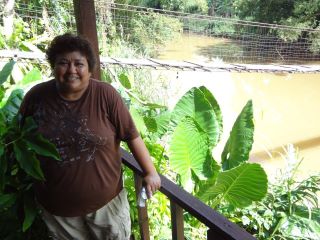My trip to Malaysia and Indonesia
I would like to take this opportunity to express my deepest thanks to all of you for all your support, encouragement, and prayers before, during, and after my trip to Asia
One of my Asia
The Roundtable on Sustainable Palm Oil (RSPO) is a global nonprofit organization encouraging sustainable harvesting of palm oil to meet the worldwide demand for the oil. The RSPO has very detailed certification guidelines in which companies must meet strict criteria from each level of the production process. One concern is how it is very hard to identify the real sources where the palm oil is being collected. Most companies that utilize palm oil do not know where it is coming from. Another challenge is to get rid of pesticides and/or look for eco friendly solutions.
I am excited with what the RSPO is doing. I think trying to get companies and small holders to use better practices when planting oil palms is a great start. In fact RSPO has been influential and inspirational in many ways to other organizations and individuals. As educator I am inspired to continue offering our guests all the different perspectives about palm oil and the many opportunities to take action. From what I have researched and observed it is very important to consider palm oil workers and consumers health issues among other issues. It was very powerful to witness at the conference a group of six delegates representing 80 families evicted in Indonesia
During my trip I was able see many species of wildlife including Sumatran elephants, Sumatran orangutans, short and long-tailed macaques, different wild birds and insects. I also saw many species of plants including wonderful flowers, trees and the most delicious fruits including durians, manggis, sauh, passion fruit, pineapple, papaya, watermelon and more. I communicated via e-mail with regular updates for the El Paso Zoo blog (http://www.epzooadventures.blogspot.com/ ) and facebook the majesty and spectacular views of the rainforest as well as many of my experiences. This trip was definitely one of the best experiences I have had in my life. The Sumatran and Bornean Rain Forest Malaysia Indonesia
I believe that having participated in this wonderful experience we have set a new standard or responsibility towards this wonderful organization, to inspire people and other organizations to support, celebrate and conserve natural resources.
I also want to present sincere thanks to our El Paso Zoo Director Steve Marshall, El Paso Zoological Society, my supervisor and our zoo Education Curator Rick LoBello, Administration Personnel, Education Department, Zoo Volunteers, and all the other people in this organization who contributed in any way to the success of my trip toMalaysia Indonesia
I also want to present sincere thanks to our El Paso Zoo Director Steve Marshall, El Paso Zoological Society, my supervisor and our zoo Education Curator Rick LoBello, Administration Personnel, Education Department, Zoo Volunteers, and all the other people in this organization who contributed in any way to the success of my trip to
I look forward to seeing each of you and express my gratitude.
I am ready to continue my adventure!
Sincerely,
Antonia Alvarado
Education Specialist
4001 E. Paisano Dr.
El Paso, TX 79905
(915) 521-1864



























